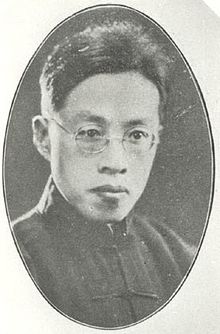Qian Mu
| Ch'ien Mu | |
|---|---|
 |
|
| Born |
30 July 1895 Jiangsu Province, Qing Empire |
| Died | 30 August 1990 (aged 95) Taipei, Taiwan |
| Era | 20th-century philosophy |
| Region | Chinese Philosophy |
| School | Confucianism |
| Ch'ien Mu | |||||||||||||||||||||||||
| Traditional Chinese | 錢穆 | ||||||||||||||||||||||||
|---|---|---|---|---|---|---|---|---|---|---|---|---|---|---|---|---|---|---|---|---|---|---|---|---|---|
| Simplified Chinese | 钱穆 | ||||||||||||||||||||||||
|
|||||||||||||||||||||||||
| Alternative Chinese name | |||||||||||||||||||||||||
| Traditional Chinese | 賓四 | ||||||||||||||||||||||||
| Simplified Chinese | 宾四 | ||||||||||||||||||||||||
| Literal meaning | (courtesy name) | ||||||||||||||||||||||||
|
|||||||||||||||||||||||||
| Transcriptions | |
|---|---|
| Standard Mandarin | |
| Hanyu Pinyin | Qián Mù |
| Gwoyeu Romatzyh | Chyan Muh |
| Wade–Giles | Ch'ien2 Mu4 |
| Wu | |
| Romanization | Ziẽ́ Móʔ |
| Yue: Cantonese | |
| Yale Romanization | Chìhn Muhk |
| Jyutping | Cin4 Muk6 |
| Southern Min | |
| Hokkien POJ | Tsînn Bo̍k |
| Transcriptions | |
|---|---|
| Standard Mandarin | |
| Hanyu Pinyin | Bīnsì |
| Gwoyeu Romatzyh | Binsyh |
| Wade–Giles | Pin1-ssu4 |
| Wu | |
| Romanization | Pīn-sy̌ |
| Yue: Cantonese | |
| Yale Romanization | Bān-sei |
| Jyutping | Ban1-sei3 |
| Southern Min | |
| Hokkien POJ | Pin-sì |
Ch'ien Mu, (Chinese: 錢穆; pinyin: Qián Mù; 30 July 1895 – 30 August 1990), was a Chinese historian, educator, philosopher and Confucian. He is considered to be one of the greatest historians and philosophers of 20th-century China.
His biographer sketches the "economic mold" of Seven Mansions, his ancestral home in Wusih, Kiangsu (now Wuxi, Jiangsu), to suggest that in his childhood world the "small peasant cosmos" of rituals, festivals, and beliefs held the family system together. He received little formal modern education, but gained his knowledge on Chinese history and culture through traditional home study.
He started his teaching career as a primary school teacher in hometown when he was eighteen. He farewelled to the rostrum at ninety-two years old.
Ch'ien arrived in Hong Kong in 1949. With help from the Yale-China Association, along with other scholars he cofounded New Asia College. He later received honorary doctorates from both Yale University and Hong Kong University.
Ch'ien relocated to Taiwan in October 1967 after accepting an invitation from the then President Chiang Kai-shek in response to the Hong Kong 1967 Leftist Riots. He was given land in Waishuangxi in the Shilin District to build his home Sushulou (素書樓) while continuing as a freelance academic researching and giving lectures at universities in Taiwan. Ch'ien retired from teaching in 1984. After becoming one of the three constituent colleges of the Chinese University of Hong Kong, in 1978 New Asia College inaugurated the Ch'ien Mu Lectures in his honour. [1]
...
Wikipedia
